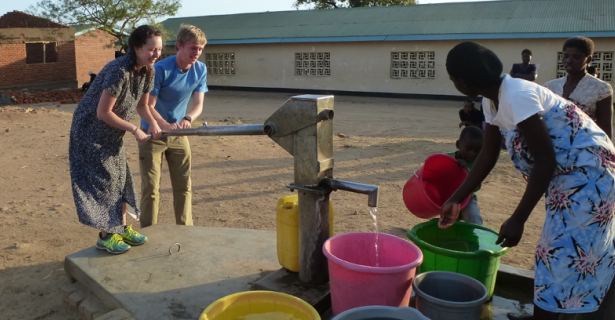Today was very eye-opening. We conducted interviews with families about their water. Many people told me, through my translator Joseph, that they have no way of knowing whether their water was clean, but that they have no choice but to drink it, as it is the only water they have.
As I walked with a group of local women to their water source, which was a runoff of a stream up a big hill, they told me how difficult it is to carry four to six 40-liter buckets each day on such a long route. Once they get to the source, they must wait in long lines as many women collect the water early in the morning.
One woman near the water held out a cup with water from the river and the village headman asked if I’d like some. Then, once I left the area, my translator offered me my purified water that he had been carrying, and I felt very guilty.
The headmaster at the school said: we’ve had a chance to see someone else’s life. This is very true, and this statement stuck with me. We take our water for granted. I took a shower with a bucket of water dumped over my head that our cook, Fanny, had kindly collected for me. This was vastly different from the 20 minute showers I can take at home.
Overall, many people do not have access to clean water, and it is expensive to buy water purification tablets, so even if they know the river water isn’t clean, they cannot do anything about it, and many people suffer from water-borne diseases.
Next day...
Today we went into Blantyre, Malawi’s second largest city, to meet with the government district section in charge of water. I was very intimidated, but they were very helpful. We talked to one woman who basically told us that although they ideally would like to implement enough water sources for every village, they simply do not have the resources to do this. They are still trying to make sure there is water access for every primary school, because when lots of young children come together they should be able to safely drink their water.
I asked many questions about their information regarding the water sources in our community of Chilaweni. She did not have updated information, because it is such a vast area and very hard to completely and accurately map with any frequency. Unfortunately, their latest information was from 2008.
The government office was supportive of our potential projects, and they gave us all of the information that they have, but unfortunately they simply do not have enough resources to provide access to water for all of their people. The people living in Chilaweni live so close to Blantyre, but there is a huge disparity between access.

